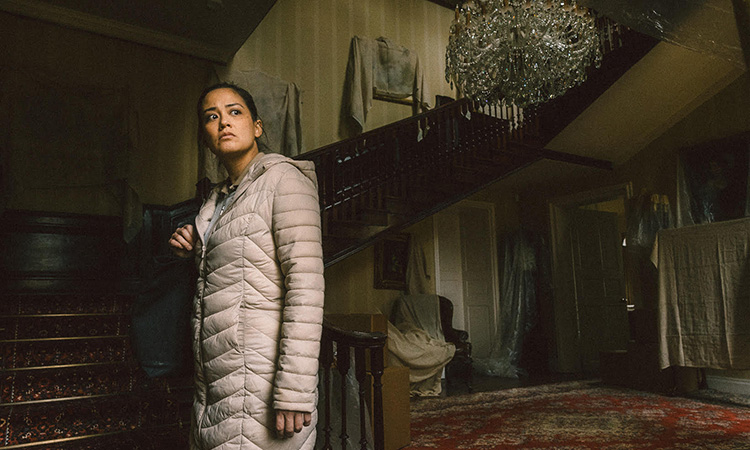Raging Grace opens with the young girl of the title (Jesden Paige Boadilla) sitting at a bedroom desk and drawing a picture of herself happily holding hands with her mother. Then the camera drifts over a sofa weirdly stacked with blankets and pillows, from under which Grace’s mother Joy (Max Eigenmann) suddenly sits up with a start.
As we wonder why Joy was sleeping in this strange hidden position rather than in a bed, and watch her cooking and feeding her daughter breakfast in the kitchen of this large, well-furnished London home, it becomes clear that they are interlopers, cuckooing in someone else’s nest.
Filipino Joy has long overstayed her visa, and when the owners of the homes where she works variously as cleaner, nurse, cook and nanny go away on holiday, she and her daughter temporarily steal in, for once being able to stretch out beyond the tiny storage lockup where they otherwise stay. It is a neat introduction both to Joy’s precarious status, and to her modest ambition to have a home of her own where she can bring up her daughter in relative security and comfort. Instead, she is constantly having to watch her back, as she struggles to put together enough money to buy counterfeit residency papers on the black market.
Moving from home to home, whether for work or for a furtive sojourn, and constantly having to wrangle a daughter who just wants, like any spirited child, to play, pull pranks and sleep in her own bed, Joy also makes regular returns to a four-storey townhouse, but cannot quite bring herself to knock at the door. Then a phone call from a friend leads to a job way out of the city, looking in on comatose old Mr Nigel Garrett (David Hayman) in his country mansion. Garrett’s adult niece Katherine (Leanne Best) is so impressed with Joy’s service that she invites her to become a live-in carer – and Joy, nervous about losing this well-paid opportunity, sneaks Grace in inside her suitcase and does her best to keep the wilful girl hidden.
This country pad, neglected but beautiful, is a classic old dark house, concealing layers of the past, in the gothic way, beneath all the dust and sheets which cover its furnishings. The walls are lined with ancestral portraits, all male, as Katherine points out, in what is an open display of patriarchal values.
This is not the first time that a Filipino woman has looked after Mr Garrett, given that as a boy he was raised first in the Philippines, and then back in England, by the maid Gloria whom he loved more than his own mother. So this house’s empty halls and locked basements echo with a history that runs parallel to Joy’s own present circumstances – a status of inequality and dependency that can easily lead to subservience and abuse.
This toxic space – literally so, given that Joy’s nursing experience tells her that Katherine is administering a poisonous cocktail of drugs to her bedbound uncle – becomes a staging ground for deep domestic dysfunction, as Joy’s growing anxieties about her new ‘master’ come to reflect her traumatic relationship with Grace’s absent father. Both these women – mother and daughter – must learn to channel their rage and confront their oppressors, if they are to break free from a repeating cycle of injustice (all at once social, racial and sexual) that would trap them in someone else’s household.
Like Xia Magnus’ Sanzaru (2020) and Lorcan Finnegan’s Nocebo (2022), this feature debut from writer/director Paris Zarcilla conceals within its genre architecture a strong sociopolitical message about the invisibility and exploitability of foreign indentured labour, always kept at a disadvantage equally by hope and fear.
“Just try to remember this is a place of work, not your home,” Katherine tells her new employee. Of course Katherine herself is a lawyer, privileged to conduct her business out of a London office – but for Joy, who has nowhere else to go, work and home have become indistinguishable, splitting her care between her arrogant, entitled employers and her own increasingly confused child.
With characters who switch on a dime from chummy familiarity to condescension and dominance, Raging Grace is a thrilling, creepy portrait of family and class divides.
Raging Grace has its Canadian première at Fantasia 2023
